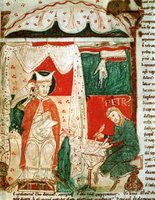
THOUGHTS FROM POPE ST. GREGORY "THE GREAT".
In medieval times the common view of "the atonement", or what transpired through Jesus' death on the cross, was known as the "RANSOM THEORY". Pope Gregory "The Great" laid out its clearest form around 600 CE. Gregory used many images to explain the effect of Christ's death on the cross upon humanity, but his favorite one was the cross as the "fishook" upon which God placed the "bait" of Jesus Christ in order to snare the devil and free humanity held captive by him. According to Gregory,
".... matching deceit with deceit, Christ frees man by tricking the devil into overstepping his authority. Christ becomes a "fishhook": his humanity is the bait, his divinity the hook, and Leviathan [Satan] is snared. Because the devil is proud, he cannot understand Christ's humility and so believes he tempts and kills a mere man. But in inflicting a sinless man with death, the devil loses his rights over man from his "excess of presumption," Christ conquers the devil's kingdom of sin, liberating captives from the devil's tyranny. Order is reinstated when man returns when man returns to serve God, his true master."
My initial thought about this theory is, does God really have to take on the persona of "The Trickster" to "outwit" Satan? Is it me or does this theory seem to bring God down to Satan's level- "I have to result to deceit to deceive the great deceiver."
What are your thoughts?
UPDATE ON THE SANCTUS FRANCISCUS SYMPOSIUM NEXT MONDAY NIGHT: I'll be meeting with the Staff Parish at Blakemore UMC next Monday evening between 7-8pm to discuss candidacy process and gain their recommendation to Charge Conference. So the symposium will now be from 9-10pm (central standard time). I hope you'll drop in.


5 comments:
Yeah- I see what you mean. It reminds me of that cheesy Carmen song where Jesus and the Devil have it out in the boxing ring, and God counts backward at the end.
On the other hand, there is something to the notion of giving the sinful impulse enough rope to hang itself. The lesson of the cross and the empty tomb is that rebellion against God will not depose God. There is nothing to be gained by fighting God.
So is God being deceptive, or is it that sinfulness is self-deceiving and stubbornly will not see what ought to be plain enough to open eyes?
In that sense, I think Gregory's model has something to add to the conversation, but leaves much to be desired.
I've never been a big fan of the ransom theory of atonement because it gives too much power and authority to Satan.
I don't like the idea that this is Satan's world and God has to pay a ransom to get the world back from Satan. It diminishes too much the sovereignty of God.
So, did you get the rubber stamp of approval?
Inquiring minds want to know.
John- I have to admit, with great shame, when I was in undergrad Carman came to MTSU and in total "PinkFloyd LaserLight" mixed with BIG THEATRICS I saw the reenactment of that very song!!! Yahhhhhh!!! Carman!!! Yiiiiieeeahhhh Boi-ee!!
Kevin- Most all of the other theories that I've read about in the last few weeks do not give Satan the autonomy in the world that this Ransom theory suggests. That was one of the strong critiques we spent time on in Scott's class a few weeks back. But most all of the theories do suggest that although God is ultimately in control, there is an aspect to this where God has allowed Satan to have his will within the world.
More to come (obviously).
This is a good question Jason. Theories of how atonement "works" must have a twin focus: 1) be true to the narrative of scripture, and 2) be relevant for the culture in which said theory is being offered. A theory could satisfy #1, but be relevant in Japanese culture, but not mine.
Or, it could satisfy #2, but not be faithful to the theology of the biblical narrative. In my opinion, this is the case with penal substitution. At least, it was for the past couple of hundred years in the West. Today, its relevance is doubted by culture and questioned by people who believe deeply in the atonement of Christ. One of the problems we've got is the fundamentalist confusion of this theory of atonement ("how") with the doctrine of atonement ("what").
Post a Comment